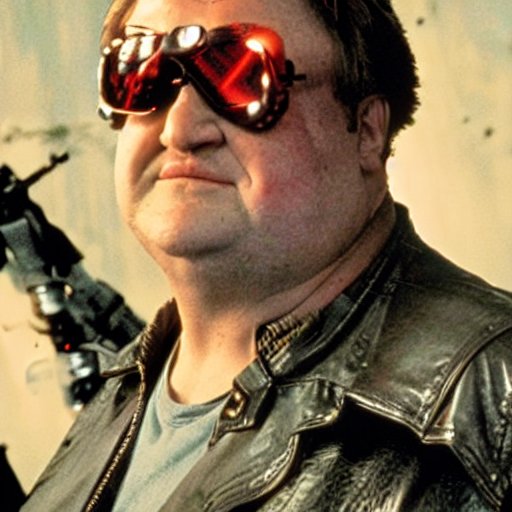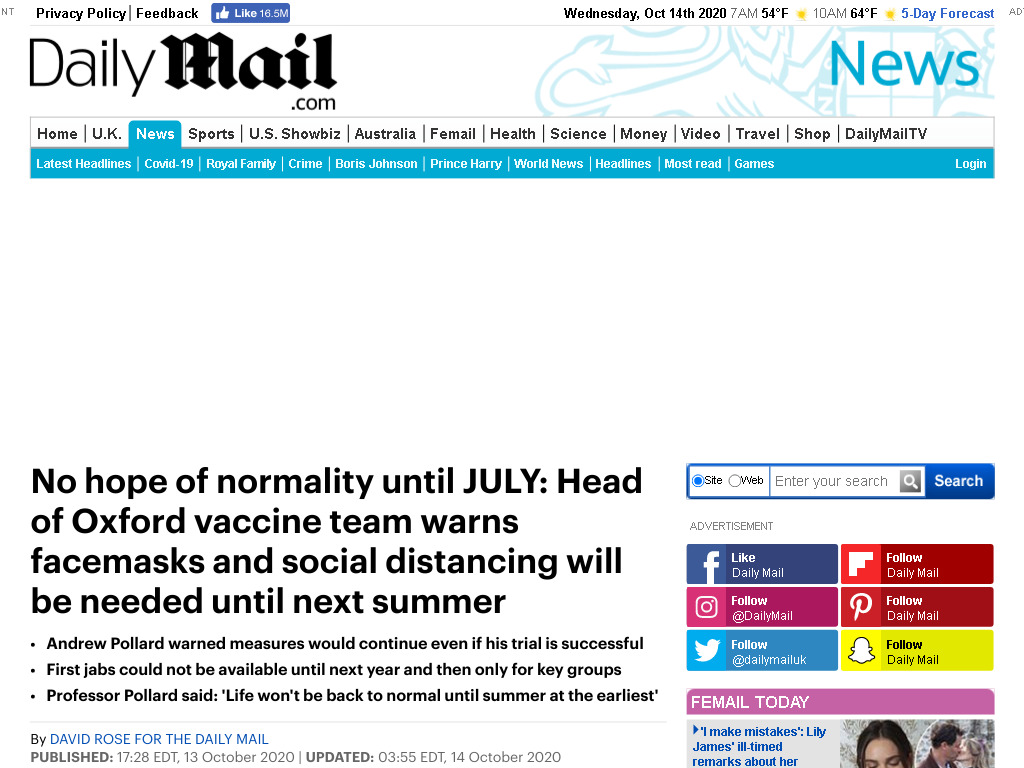Facemasks and social distancing will be needed until next summer, the head of Oxford's vaccine trial team said last night.
Andrew Pollard warned strict rules would have to be followed even if global tests proved successful. He said the first jabs would probably not be available until next year – and then only for key groups such as frontline health workers.
Professor Pollard said that he hoped the final trials could be completed by the end of this year but added: 'Life won't be back to normal until summer at the earliest. We may need masks until July.
If we end up with a vaccine that's effective in preventing the disease, that is by far the best way to control the virus. But in the medium term, we'll still need better treatments. When does life get back to normal? Even if we had enough vaccine for everyone, in my view it's unlikely that we're going to very rapidly be in a position where the physical distancing rules can be just dropped.
'Until we've got a high level of immunity in the population so that we can stop the virus so most vulnerable people are immune, there is going to be a risk. Initially, we're going to be in a position where mask-wearing and social distancing don't change.
'Only when there is a big drop in serious cases will governments feel able to relax these measures. This is a very easily transmissible virus.'
The Oxford University vaccine, produced with drugs giant Astrazeneca, is one of only nine to have reached phase three trials, the final stage before implementation, and is widely seen as the leading candidate to deliver.
In his remarks to an online seminar with Oxford alumni, Professor Pollard explained that, if successful, the vaccine will need approval from the Medicines and Healthcare products Regulatory Agency.
He said: 'Once we have the trial results, I can't imagine they will do that overnight.
'They will have to scrutinise the data very carefully – the public would not expect any less.'
The final evaluation, he said, is likely to take weeks, even though he and his team have begun a 'rolling programme' to give the regulatory agency access to the trials while in progress.
Rolling out the vaccine will pose a 'huge logistical challenge', the professor pointed out.
In his remarks to an online seminar with Oxford alumni, Professor Pollard explained that, if successful, the vaccine will need approval from the Medicines and Healthcare products Regulatory Agency.
He said: 'Once we have the trial results, I can't imagine they will do that overnight.
'They will have to scrutinise the data very carefully – the public would not expect any less.'
The final evaluation, he said, is likely to take weeks, even though he and his team have begun a 'rolling programme' to give the regulatory agency access to the trials while in progress.
Rolling out the vaccine will pose a 'huge logistical challenge', the professor pointed out.
Oxford's vaccine is based on a genetically engineered type of coronavirus that gives chimpanzees a form of the common cold.
Trials of the jab involve 20,000 volunteers in Britain and other countries being given either the vaccine or a harmless placebo.
Professor Pollard said early results had shown that the vaccine causes the body to make antibodies against Covid, and that these last for at least three months.
Tests on volunteers given the jab in April will soon show whether they lasted for six months. 'The evidence so far in the lab is that the antibodies are able to stop the virus in its tracks,' said Professor Pollard.
At least one person in the trial has become seriously ill, and has had to be hospitalised with the disease, he added.
Kate Bingham, head of the UK Vaccine Taskforce, said there was only a 'slim' chance the Oxford jab could be ready by Christmas.
She said she felt optimistic from the data seen so far in trials. But she warned against assuming a Covid-19 vaccine would be better than flu jabs, which are only around 50 per cent effective.
'It's most likely that it'll be next year,' she added.



Oh, okay. If some US states with low population density have had no increase in cases, because people didn't behave like complete idiots, then this certainly disproves anything virologists and epidemiologists have thought to know, and renders the experiences of countless countries around the globe as insignificant. Seriously, how can you even come to the conclusion that wearing masks, social distancing, and avoiding large gatherings is ineffective? Does the virus transmit through magic?
In other News, the last winter in New England has been quite cold. Climate change is fake.
New England is the densest region of the US, wtf are you taking about?
It isn't, and the states with higher population density had a sharp spike at the start, then got it under control by taking strict measures. Now it is increasing again.
https://puu.sh/GCW9f/3814bc1959.png
What are you taking about? Massachusetts and Connecticut -where most people in NE live and two of the densest states in the country - have had indoor dining and gyms for 3+ months and had no summer spikes. Maine has had people from all over travelling there, and no fucking way they all took a Covid test. It's increasing now, months and months after things opened up, which is proof that those cannot be the cause!
And so did many countries... No one is saying that this is impossible, but it can only be done after getting the cases down. How do you do that? By enforcing more extensive restriction on public life. How did Massachusetts get to the point of low incidents again? By doing exactly this. What did Boston look like? Like this: https://www.youtube.com/watch?v=dXqj3Xowhfg
Your conclusion:
Why didn't reopening lead to a spike?
deleted by creator
Lib brain world salad. Massachusetts did everything "so right" because we killed off all the vulnerable in March/April.
deleted by creator
Bruh I'm in Maine and one positive at a wedding spread to like 200+ people. Schools are still closing etc. High school almost entirely online. Its less restrictive but Winter is gunna be brutal on small businesses. Half the storefronts are already empty it seems